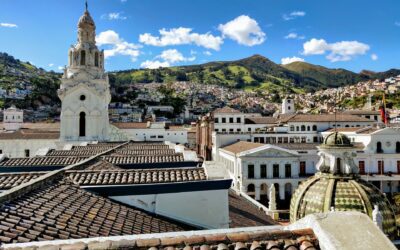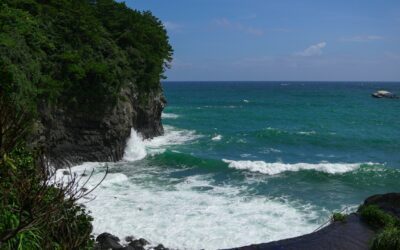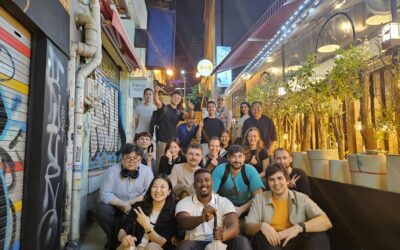|
|
Türkiye, or Turkey, is the latest country to launch a digital nomad visa to encourage remote workers to enjoy an extended period living and spending in their country.
Türkiye has always been a popular holiday destination thanks to its beautiful beaches, fascinating history, intriguing culture, and affordable cost of living. Now you can spend a year or more exploring Türkiye as a digital nomad.
Read on for the visa requirements and how to apply, plus what to expect from living in Türkiye as a digital nomad.
Who Can Apply for the Türkiye Digital Nomad Visa?
The Türkiye digital nomad visa is open to a limited audience. Applicants must be between 21 and 55 in age and must hold a passport for an EU or Schengen country, the United Kingdom, the United States, Canada, the Russian Federation, Ukraine, or Belarus.
Applicants must also be able to demonstrate that they hold a university degree, that they are currently employed or self-employed, and that they have a minimum income of US$3,000 per month of US$36,000 per year.
The visa is granted for up to one year in the first instance and is renewable if you continue to meet the criteria. You can apply for visas for family members to accompany you to Türkiye.
How to Apply for the Turkey Digital Nomad Visa?
To gain access to Turkey as a digital nomad, you must first apply for a Digital Nomad Identification Certificate online via the Digital Nomad Go Türkiye website. If your documents are accepted, you will receive the certificate, which you can then use to make your visa application at a Türkiye Visa Center or Consulate for yourself and your dependents.
The required documentation for the online application includes:
- A valid passport with at least six months validity from the day of arrival
- Diploma or certificate proving that you are a university graduate
- Documents showing that the applicant is a remote worker
- Biometric photo
- Documents proving you meet the minimum income requirements
When you go on to make the visa application, you will also need to provide proof of travel health insurance and proof of accommodation in Turkey. Applying online for the digital nomad certificate is free, while the cost of the visa depends on the country that you are applying from.
Cost of Living in Türkiye
Türkiye enjoys a highly affordable cost of living, especially when compared with some of its nearby European neighbors. The minimum income requirement for the visa means that digital nomads should have no problem living comfortably.
Numbeo estimates that a single person only needs a little more than US$500 per month to live comfortably in Türkiye excluding rent, though you will want more to participate in many of the adventures available.
Airbnb offers many extended stays in Turkey. They start from as little as US$2,000 per month, but there are villas that can cost US$5,000-$10,000 per month in the resort areas. If you find something on the local market, you might expect to pay US$400-$1,000 per month.
Pros and Cons of Turkey for Digital Nomads
Besides the excellent new digital nomad visa and the low cost of living, what are some of the pros of living in Türkiye as a digital nomad, and what are some of the cons to be aware of?
Türkiye Pros
- Turkey has sat at the crossroads between East and West for millennia, which has resulted in a vibrant and interesting culture. Not only are there many incredible historical sites to visit, but modern Turkish culture has been shaped by this meeting of cultures.
- Turkey is naturally very beautiful characterized by Mediterranean and Aegean coasts, incredible rock formations in Cappadocia, and many jaw-droppingly beautiful green spaces and national parks.
- Expect hot summers with very little rain perfect for enjoying the many beaches and mild winters that still let you explore. But prepare for very high temperatures in the height of summer.
- Internet infrastructure is excellent in Turkey’s cities, meaning that digital nomads can effectively mix work and play.
- Despite its proximity to some troubled countries, Turkey is considered a very safe country with low crime rates. The culture is also welcoming, with locals happy to include expats and digital nomads in their communities.
- The food and the coffee are excellent, and there are options whether you are a carnivore or vegan. Think hearty stews, tasty kebabs, and plenty of fresh fruits and veggies.
- If you are interested in connecting with other people like you, there is a large expat community in Turkey. While that might not be what you are looking for, it also means that local communities are prepared to welcome foreigners. Turkey has an excellent healthcare system, and while digital nomads need private insurance, they should have no issue finding qualified doctors and modern facilities when needed.
- Transport around the country is fairly convenient and affordable with a good network of buses, trains, ferries, and flights. Long distance buses tend to be the cheapest and most convenient way to get around.
Türkiye Cons
- While English is widely spoken in tourist areas, it tends to be basic, and it can be difficult to have meaningful communication if you don’t speak the local language.
- Turkey enjoys a slower pace of life and you should generally expect everything to take about three times longer than you expect.
Türkiye’s Major Cities
The Turkish government is encouraging digital nomads to consider setting themselves up in seven main cities.
Istanbul
Istanbul has been a major cultural crossroads between Europe and Asia for millennia. Formerly the Eastern Roman capital of Constantinople and later the center of the Ottoman Empire, the city is layered with history and continues to be a cultural melting pot. With 20 million inhabitants, it is also the country’s business and innovation hub.
While Istanbul has an excellent public transport network, it is a massive city and takes time to get around. Sultanahmet is the historical center, while nearby Beyoğlu has the best nightlife. Kabataş & Beşiktaş are some of the most culturally vibrant districts with plenty of restaurants and bars.
Visit historical sites like the Hagia Sophia, Blue Mosque, Topkapi Palace, and Basilica Cistern. Find exotic treasures at one of the many bazaars and the Ferikoy Flea Market or visit the unique high-end boutiques in the Nişantaşı area. For greenery, head to Belgrad Forest, a wooded area covering 1300 acres, or visit the tulip blooms at Gulhane Park. In the evening, watch live jazz at Bova or dance the night away at Minimuzikhol. You can also take day trips from Istanbul to the site of ancient Troy.
Istanbul has several excellent coworking spaces including JUSTWork, Workinton Macka Nisantasi, Impact Hub, Kolektif House Atasehir, and DAM.
Antalya
Antalya is down on the south coast of Türkiye, and like many of the locations being pushed by the Turkish government is a tourist and resort destination. It is a stunning blend of beaches and green beauty, historical sites, and vibrant modern culture. But you can expect to see quite a few well-heeled tourists whenever you visit.
Head to the Old Town for winding cobbled streets and historic buildings from the Roman, Byzantine, and Ottoman periods. Hadrian’s Gate is a must-visit highlight. There are also several UNESCO World Heritage Sites in the area including the ruins of Aspendos, Pamukkale, and Hierapolis.
The beach resort atmosphere means plenty of restaurants and bars and a pumping nightlife. When you need to work, head to coworking spaces such as Coworking Antalya, Work C, and Creawork.
Izmir
Izmir is on the Mediterranean side of Türkiye facing Greece. It is known for its 629-kilometer coastline and vibrant seaside culture. But it is actually the third largest city in the country with more than three million inhabitants.
In addition to the beaches, some of the best places to explore in the city include the Keremalti Market Bazaar, the ancient Agora, and the famous clock tower. There are also several excellent coworking spaces in the area including Originn Coworking, Withco Coworking, and Lokasyon Coworking.
Dalaman, Marmaris, Bodrum, and Fethiye
While these are all separate cities, I have listed them together as they are all very close to one another in southwest Türkiye on the beautiful Aegean coast. They are all known for their pristine beaches and seaside lifestyle, surrounded by untouched lush green spaces.
There are many unique historical sites in the vicinity including ancient Lycian rock tombs, the ancient city of Xanthos, and the ghost village of Kayakoy. There are also many Turkish baths in the area and the famous Dalyan mud baths.
Dalaman is a more relaxing place than Istanbul but expect fancy resorts and high-end boutiques that push prices up. While Dalaman is not as well connected as Istanbul, you will find an intriguing coworking and coliving space in Dalyan Digital Nomads.
Marmaris is just north of Dalaman and is known for its beautiful beaches, vibrant nightlife, and excellent shopping. As well as the beaches, you can enjoy Marmaris National Park. The Old Town, located below Marmaris Castle, is authentically atmospheric, and nearby Icmeler Old Village feels like traveling back in time. While Marmaris has a small population of only around 100,000, it has a pretty good coworking space in Yeni Hub.
Just a little further north, Bodrum has been a beach holiday destination for A-listers for decades. The Old Town streets feel a bit like Santorini, with distinct white and blue buildings. But you will also find luxury hotels, boutiques, and yachts everywhere. The nightlife is particularly good. There are a few coworking spaces including CoBodrum and helo! Bodrum.
Just south of Dalaman, Fethiye is a small town with a beautiful marina promenade. It already has a large expat population, so it is well-prepared for digital nomads. It is particularly known for the spectacular sunsets off Calis Beach. There are several good coworking spaces including TO DO Coworking, Lokal, and Hipokampus Fethiye.
Other Cities
While the Turkish government might not be promoting these destinations, there are other great cities for digital nomads in Türkiye.
Adana is located in the south near the border with Syria and is known for its fiery cuisine and welcoming people. It feels a little more authentic than the Aegean beach towns. It is the home of the kebab and has plenty of Roman ruins and grand mosques.
Ankara is the country’s second-largest city and has been a major center since ancient times. It is the nation’s capital and mixes historic grandeur and contemporary spirit, but its inland location means there are no beaches in site. Expect bustling streets buzzing with urban energy, and some of the fastest internet speeds and most interesting start-ups in the country.
Bursa is an incredibly green city known for its beautiful hills, lush gardens, and thermal baths. It is a peaceful city that looks like it was frozen in Medieval times when it was the first Ottoman capital. But it is not so serene that you won’t feel inspired and entertained on a daily basis.
Start Packing?
The new Türkiye digital nomad visa offers a great opportunity, as previously most visitors could only stay for 90 days at a time as a tourist. Türkiye is such a large and fascinating country with so much to explore, even after a year, you won’t have seen everything.











